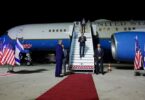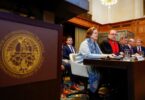F.P. Report
ISLAMABAD: The accountability court on Thursday rejected a plea filed by National Accountability Bureau (NAB) for inclusion of Panamagate Joint Investigation Team (JIT) probe report as part of the case record.
Accountability Judge Muhammad Bashir is conducting trial in Avenfield property reference filed against Nawaz Sharif, his daughter Maryam Nawaz and son-in-law Capt (retd) Muhammad Safdar.
At the outset of court proceedings on Thursday, the defence lawyer requested the court to exempt his clients from personal appearance as the former premier is unwell.
Judge Muhammad Bashir granted permission to Sharif and his daughter Maryam to leave after marking their attendance. However, the judge directed Maryam’s spouse to remain present at the courtroom.
The hearing was then adjourned till 10:00 am owing to absence of NAB’s key witness FIA Additional Director Wajid Zia, who was also the head of Panamagate JIT.
Following the recess, the court resumed hearing of the case again after the witness appeared before the court.
Zia informed the judge that he was tasked to conduct investigation into authenticity of a letter provided by the Qatari Prince, Sharif’s offshore companies named Gulf Steel and Hill Metals Company.
He said the investigation mainly surrounded the question as how the assets of Nawaz Sharif and his dependants were increased manifold.
Maryam’s lawyer Amjad Pervez objected to the statement and argued that the witness was referring to an order which was not part of the record, besides his clients were not provided the copies of the ruling.
The NAB prosecutor then pleaded with the judge to include the JIT report into the case record. The defence lawyer opposed the plea and maintained that a summary couldn’t be made a part of ongoing proceedings as evidence.
“Nothing of the JIT report can be exhibited by the witness. Zia was the investigation officer of the JIT team. The witness can only produce as evidence what he himself has stated or found,” argued Parvez. “How can Zia produce the investigation report as evidence in the court of the trial? The opinion of the JIT cannot be exhibited as evidence here. The statements of witnesses and accused cannot be produced here as evidence,” he further questioned, adding that the only admissible evidence is what Zia himself collected.
“Under what law can this investigation report be produced as evidence?” he argued. NAB’s prosecutor Muzaffar Abbasi said that the witness conducted the investigation as per the Supreme Court’s directions and that it can be produced in court as evidence. Zia sought permission from the court to speak, and said, “each and every volume is connected and one can only comprehend it when produced completely and all together.” Parvez then referred to multiple judgements including one of 1958.
At this, Abbasi said that if the NAB would have conducted the investigation and the report, then the defence counsel could have raised this objection.
“Zia is appearing as a witness, not the Investigation Officer,” Abbasi argued. “This is a special case, the witness has compiled the report and it can be exhibited.” In response, Parvez said, “Each volume of the report contains a section called “summary of investigation” and it carries the JIT’s opinion. Guilty or not guilty is the prerogative of the court and not the JIT.” He further added that the SC itself always refers to the report as an investigation. The prosecutor then pleaded with the judge to include the JIT report into the case record. The defence lawyer opposed the plea and maintained that a summary couldn’t be made a part of ongoing proceedings as evidence. The hearing was then adjourned until March 15, when Zia will continue recording his statement.






